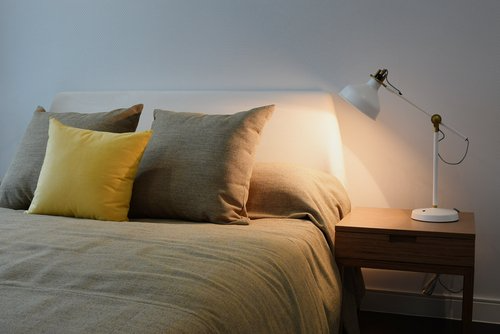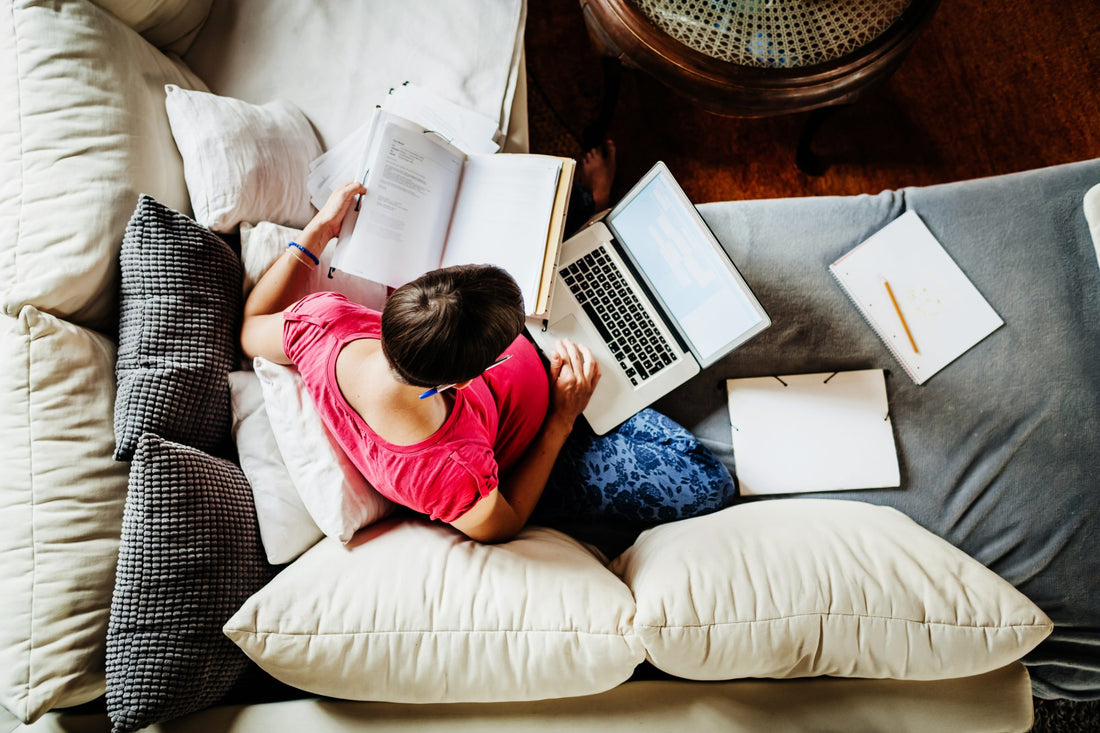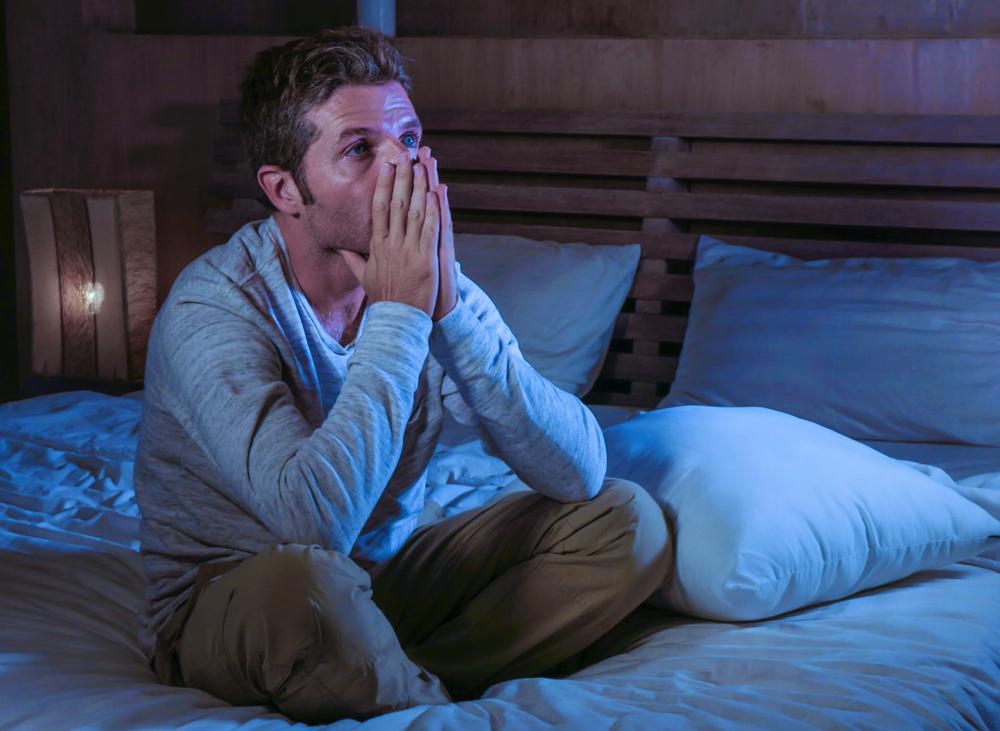News
How to Create the Perfect Sleeping Environment
wp:paragraph You may already know the importance of creating good sleeping habits overall, but did you know just how much of an impact your sleeping environment has? /wp:paragraph wp:paragraph Making your bedroom the perfect sleeping environment is essential for a good quality sleep each night, so that you can function well during the daytime. After all, you spend a third of your life sleeping, so skipping out on a quality sleep is not something you want to do! /wp:paragraph wp:paragraph Here are six tips for creating the perfect environment for sleeping /wp:paragraph wp:list {"ordered":true,"type":"1"} Keep the room dark while you sleep: leave the lights off and use blackout curtains. Bonus tip: chose a color for your bedroom walls to help promote a calm environment and avoid anything too flashy. Keep the room temperature a little on the cooler side: having a cool room is best for sleeping, but make sure you are not so cold that you are shivering at night. Keeping your room too warm can be uncomfortable and you may find yourself tossing and turning. Leave electronics out of the bedroom: many people like to fall asleep with the TV on but this is not recommended, keep it in a separate room. You should also try and leave your phone and tablet charging in another room overnight. Be mindful of any noise: background noise can be distracting while you are trying to sleep. If you are a light sleeper and you wake easily, you may want to consider using a white noise machine. Use your bedroom (and especially your bed) for sleeping only: resist the temptation to use your bedroom as an office, lounge area, or social space and keep the clutter in your bedroom to a minimum. This way you can fully relax once it’s bedtime and you won’t feel anxious about other life factors. Make sure your bed is comfortable: invest in a good quality mattress and pillows (depending on which position you sleep in) and don’t overdo it with the covers. /wp:list
about How to Create the Perfect Sleeping EnvironmentIs Remote Working Affecting Your Sleep?
wp:paragraph Once the Covid-19 pandemic hit back in early 2020, many office employees found themselves all of a sudden having to work from home. While the remote working life certainly has its convenience and comforts, let’s not forget the many challenges it presents, such as navigating Zoom meetings and other new technologies as well as a bit of a setback in healthy habits including diet, exercise and yes, sleep. /wp:paragraph wp:paragraph Why remote workers are known to struggle with sleep /wp:paragraph wp:paragraph According to a recent study done by the CDC, many adults who work remotely as a result of the pandemic have not been getting the recommended amount of sleep at night, and a few have reported experiencing insomnia as well. This can cause you to feel tired during the daytime when you need to be alert and productive. Having both your personal and professional life co-exist in the same space can be tricky, and you may find yourself having work on your mind as you go to bed a little more than usual. /wp:paragraph wp:paragraph Many workers have reported working much later hours at home than they typically would at the office, and proper bedtime habits have taken a bit of a backseat. In addition, too much time on your phone or computer at night can interfere with your REM sleep cycle, causing insomnia and other sleep ailments. You may also find yourself making more frequent trips to the kitchen throughout the day to grab a snack or a cup of coffee but overdoing this can also affect how you sleep at night. /wp:paragraph wp:paragraph A few tips for getting the best sleep while working from home /wp:paragraph wp:list Try not to use your bedroom as an office. Set a designated workspace in your home that is separate from where you sleep. More importantly, don’t work from your bed! Try to stick to as close to a normal workday routine as you can, even at home: shower and get dressed in the morning, eat a proper breakfast, take a proper break for lunch and stop working for the day once the working hours have ended. Resist the urge to check work emails and complete work projects in the evenings, or anytime outside of the working hours. Go to bed at the same time every night, and get at least 8 hours of sleep per night, just like you would if you had to commute to an office the following day. Be sure to practice proper sleep hygiene too, including limiting technology devices before bed and sticking to a proper bedtime routine. /wp:list
about Is Remote Working Affecting Your Sleep?How Stress Affects your Sleep
wp:paragraph It is no secret that most of us have experienced stress in one way or another, especially these days seeing as we are still in the middle of a global health pandemic. Stress is something that can influence the body in so many ways, including how you sleep. If you have ever found yourself tossing and turning in the middle of the night and you cannot seem to fall asleep, you are not alone. /wp:paragraph wp:paragraph How to tell if stress is causing your poor sleep /wp:paragraph wp:paragraph First, getting poor sleep at night can have a significant effect on how you function during the daytime. If you are finding yourself having low energy, trouble concentrating, and you are in a negative mood, then your sleep may be to blame. /wp:paragraph wp:paragraph Sleepless nights do happen to all of us every now and then, however it becomes a concern when this happens many nights in a row and if affects how you function in the daytime. /wp:paragraph wp:paragraph With everything going on in the world these days, it is easy to have a lot on your mind when it is time to go to bed, but do not let this take a toll on your sleep routine. If this is not addressed and dealt with, this can lead to more significant health conditions. /wp:paragraph wp:paragraph How to reduce stress levels to improve your sleep /wp:paragraph wp:paragraph Whether your stress is caused by the current events in the world, or factors in your personal life such as work or relationships, it is important to identify the source of the stress and try to address it. While it may seem challenging and it may be difficult to resolve, knowing what is causing your stress can be important to helping you sleep better. /wp:paragraph wp:paragraph There are few other healthy habits to incorporate in the daytime that can help you sleep better at night: /wp:paragraph wp:list Limit the time you spend on electronic devices Get in some exercise during the daytime Stick to eating a healthy diet Limit your caffeine and alcohol intake Practice some mindful meditation techniques before bedtime Seek support from family or friends Speak to your doctor if you have exhausted all your other options to no avail /wp:list
about How Stress Affects your SleepBack to School Sleep Tips
After the fun and relaxed pace of summer, easing back into the school year routine can be daunting. But starting and maintaining a heathy sleep schedule is crucial to your child’s ability to learn, engage, and grow. Here are five easy tips to help your child adjust to the right style of sleep needed for school: Before school begins, start getting your children used to the sleep schedule they will follow during the school year. Allow about two weeks, and work incrementally with an earlier bedtime and wake up time. Create a relaxing bedtime routine. This can mean a bath and bedtime stories for younger kids, or reading for older ones. Avoid strenuous, exciting, and loud activities, including television and video games. Avoid larger snacks and meals close to bedtime because digesting large amounts of food can be disruptive. If your child needs a snack, look to warm milk, plain yogurt topped with real fruit, or cheese and crackers. Build a relaxing bedroom. This promotes an easy and deep sleep. Try using blackout curtains, keeping the room cool, and removing as many distractions as possible that could encourage your child to stay awake instead of sleep. Do you know a great way to encourage healthy sleep patterns? By modelling them yourself! You can show your child how important a healthy sleep is by doing all of the things that you tell your child to do. What’s great is that you too will get better sleep. What’s not to like? Having to restart a schedule can signal the end of summertime fun, but it will make the transition to school easier. By following the simple tips above, you make this transition relatively seamless while ensuring your child gets the sleep they need in time for school. Explore All CPAP Products and Collections
about Back to School Sleep TipsSleeping with CPAP
Needing sleep apnea machines, or CPAP, to improve your sleep is a great solution, but what about the reality of the situation? With a mask, tubes, and straps, will you actually get a good night’s sleep? As the saying goes: try it, you’ll like it! Of course, using CPAP will take some getting used to. That starts with the actual gear you need. With sleep apnea, you stop breathing for short moments, possibly up to 30 times every hour. This happens because your airways close or are blocked. Your CPAP machine uses gentle pressure to push air through, keeping your airways open. This requires a machine that contains a pump that regulates the air flow, and a tube to carry that air from the machine to a mask that you wear over or mouth and/or nose. Straps keep everything in place. Obviously, wearing a mask over your face with straps to secure it does not, at first glance, seem like a great way to get a good night's sleep. But there are different designs, such as a nasal mask or a full mouth-and-nasal mask, which can provide the right fit for you. Try out the different options to see which one is more comfortable. You may need several tries and fittings to find the one that works for your specific needs. Ask your doctor and sleep specialist for tips and strategies to help you adjust. Then there is the machine itself. Earlier sleep apnea machines were large and noisy; perhaps you have this image you have in mind. But as technology advances, so do the designs of sleep apnea machines. They have become smaller and quieter, making sleep easier to achieve. To push the air through, your CPAP machine may have different pressure settings. You can ask your doctor to adjust the settings to find the appropriate level for both your comfort and sleep. Finally, if you find that your CPAP machine is drying out your nose and mouth, ask about a humidifier for your machine, or one that even heats the air to make it moist. Everyone knows the benefits of a great night’s sleep, but some people need extra help getting that. By using your CPAP machine correctly and making the necessary adjustments, you too can enjoy some sweet slumber. Shop Reliable CPAP Machines
about Sleeping with CPAPTime change adjustment tips for CPAP users
This past weekend, many of us enjoyed an extra hour of sleep thanks to the Daylight Savings time change that occurred. As nice as that hour of sleep may have been, many of you may admit to having a bit of trouble sleeping at night, not just because of the time change itself, but because of how your internal body clock is programmed. When you use a CPAP mask at night, routine is so important for ensuring that the therapy works properly and you get a good night’s sleep. The “fall back” time change can affect your circadian rhythm, the part of your brain that reacts to light patterns in the day and night. And as great as it may have felt to sleep in for that extra hour, many of you may admit to your sleeping patterns being a bit haywire right now. Common symptoms of this include: increased headaches, lack of focus throughout the day, feelings of loneliness or depression, and possible spurts of insomnia throughout the night (and this includes waking up earlier than normal) But fear not: as much of an adjustment this may be, there are ways you can work yourself back into your normal sleep routine and start sleeping normally at night again. Here are a few tips to adjusting to the time change: Regardless of whether you actually feel tired or not, go to bed at your usual time. It may take you a bit longer than normal to fall asleep, but this helps to reprogram your body’s internal clock. Likewise, try and wake up at your usual time each morning. Keep your bedroom cool and dark to help with the bedtime relaxation process Give yourself some time before bed to wind down from your hectic day: turn off the TV and put your electronics away, take some time to read a book, have a cup of herbal tea, practice some deep breathing or do any relaxing activity that helps you sleep better at night Avoid having alcohol, or any caffeinated drinks for a few hours before bedtime Try and get some sunlight exposure when you wake up in the morning (at least for a few days). This helps your internal body clock adjust to the new time. Shop and save on all cpap machines and accessories at Papsmart.com
about Time change adjustment tips for CPAP users5 Tips for New CPAP Users
So you’ve just been diagnosed with sleep apnea and you’ve been told by your doctor that you have to use a CPAP mask every night, in order to treat this condition. Needless to say, you’re probably feeling a little nervous and apprehensive about this and you’re worried about a number of things: is it worth it wearing that big mask? Will my partner still want to be intimate with me? Am I going to have to deal with red marks all over my face for the rest of my life? Like any big change in life, it is normal to have apprehensions about this and it is okay to be worried about what is to come. But what is important it focusing on the positive aspects of this: in this case, your ability to get a much better sleep at night. Here are five tips to help you adjust to your new CPAP mask: Take your time selecting a mask! Most people who buy eye glasses don’t usually go with the first pair they see, they take their time to try on many pairs, until they find one that is just right. A tip from the Mayo clinic suggests that you place a new mask on your face without any straps. Once it feels comfortable, add the straps and then see how you feel. Try wearing just the mask around the house for a few hours to get used to it. If you still feel some anxiety, try to practice some relaxation exercises, such as deep breathing. Start small: if the idea of forcing air down your airway makes you cringe, try using your mask on the lowest air pressure setting to start, and increase it as you become more used to the mask. Keep moisturized! It is very common for CPAP users to experience a dry mouth or nose when they wake up, especially in the winter months. Let’s face it: it’s not a comfortable or pleasant feeling to have a dry mouth. Try to use a nasal spray before you go to bed, or think about getting a humidifier for your CPAP mask. If it feels weird at first, resist the urge to discontinue it after just one night. Remember that this is a device that could very well be saving your life, and your quality of sleep will get much better with time! Do not hesitate to talk to your doctor if you have any concerns. Get Set Up with a New CPAP Machine
about 5 Tips for New CPAP UsersHistory of CPAP
Can you believe that the CPAP machine is 34 years old? When you look at the original, it’s probably hard to believe that technology has come such a long way. Let’s go all the way back to 1970. Around that time, sleep was not as commonly studied medically as it is today, despite being one of the most important human functions. What we know today as sleep apnea, was known at the time as Pickwickian syndrome (named after a character from Charles Dickens’ The Pickwick Papers who is obese and tends to fall asleep standing up). The only known symptoms for that condition at that time was snoring, and chocking and gasping in your sleep. This was all a big mystery in the medical profession, and not much was known about it. If you had sleep apnea at this period of time, your only hope was for a tracheotomy. In other words, doctors would cut a hole in your trachea and insert a breathing tube to help you sleep better at night. Sounds painful, right? This would all soon change, thanks to an Australian doctor named Colin Sullivan. He had spent many years studying sleep medicine in depth and essentially, changing the way that we look at sleep problems. In 1980, he invented a machine that would end up saving many lives from sleep apnea. This was called the Continuous Positive Airway Pressure machine (or CPAP for short). It is a machine and mask that is worn by people with sleep apnea to help them breathe at night. He invented it by connecting a number of different hoses to a vacuum cleaner and glued it to the snout of a dog. When he saw his first human patient, a construction worker with severe OSA, the results of the mask spoke for itself as the man said he hadn’t felt so well rested in ages. Although it took some time to be accepted in the medical market, the CPAP machine has come a long way, and still continues to save the lives of many people who suffer from sleep apnea. If you are a proud user of this device, you have an Aussie doctor and a vacuum cleaner to thank. Shop at Papsmart.com - The #1 Online CPAP Store. Read ResMed’s historical CPAP reference PDF Learn about the history of CPAP therapy on CPAP.com Read how the first CPAP was invented using a vacuum cleaner — EasyBreathe Learn how a tracheotomy is performed on WikiHow
about History of CPAPSleep tips for runners
For all you runners out there, the night before a marathon run can feel like the night before Christmas. On the one night where getting enough sleep is crucial to your performance the next day, it’s easy to forgo sleeping in favor of tossing and turning and lying awake in anticipation. This is no time to skimp out on the shut-eye. Tired and groggy are two things you do NOT want to feel on the day of a big race that you’ve spent countless weeks training for. Sleeping right is just as important as eating right and it is very important that you make sleep a priority, especially the week before the race. Don’t feel bad if you have to pass on some other commitments in order to get the proper 8 hours per night that you need. Here are some tips to keep in mind when preparing for your next big marathon: Make sure your room is the perfect sleeping environment: keep the room cool and dark and keep your electronic devices out of the room Before you go to sleep, take 5 minutes to yourself and relax. Get yourself into a position that is comfortable for you and focus on your deep breathing. Take this time to mentally compose yourself and push away any negative thoughts that are dragging you down before the race. Get organized. The week before the race, plan out exactly what you’re going to wear and exactly what you’re going to eat so you won’t have to think of it the morning of. Take it a step further by making yourself a to-do list so that you don’t forget anything. Don’t stress! While being a little bit nervous is not a bad thing at all, stressing about a race too much can impede on your final race time. Stay calm and relaxed and just imagine the pride you’ll feel once it’s all over with. Save Big During the PAPSmart Fall Sale Runner’s World: Tips for improving pre-race sleep
about Sleep tips for runners





